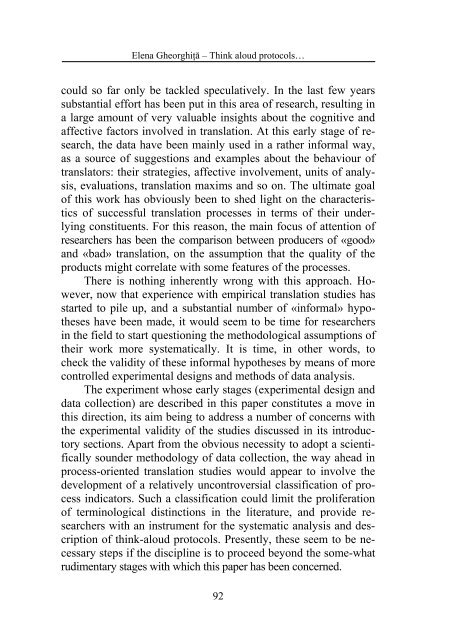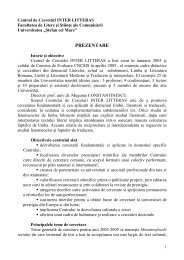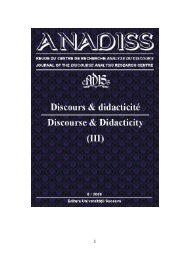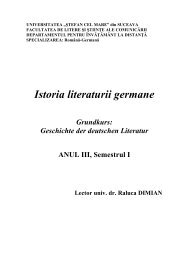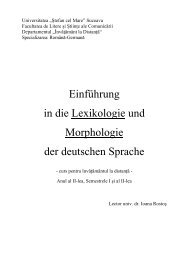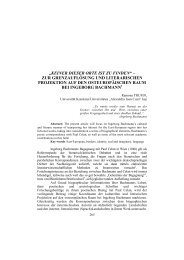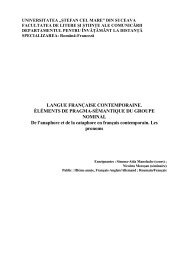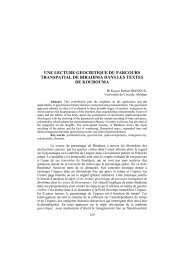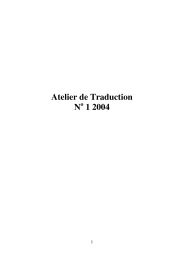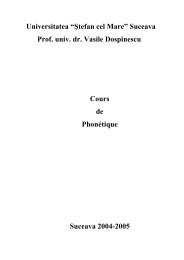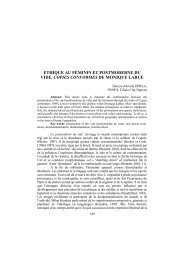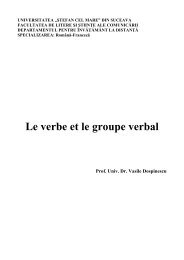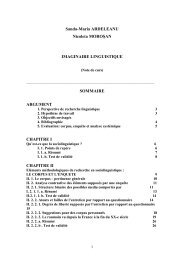Le discours de la francophonie
Le discours de la francophonie
Le discours de la francophonie
Create successful ePaper yourself
Turn your PDF publications into a flip-book with our unique Google optimized e-Paper software.
Elena Gheorghiţă – Think aloud protocols…could so far only be tackled specu<strong>la</strong>tively. In the <strong>la</strong>st few yearssubstantial effort has been put in this area of research, resulting ina <strong>la</strong>rge amount of very valuable insights about the cognitive andaffective factors involved in trans<strong>la</strong>tion. At this early stage of research,the data have been mainly used in a rather informal way,as a source of suggestions and examples about the behaviour oftrans<strong>la</strong>tors: their strategies, affective involvement, units of analysis,evaluations, trans<strong>la</strong>tion maxims and so on. The ultimate goalof this work has obviously been to shed light on the characteristicsof successful trans<strong>la</strong>tion processes in terms of their un<strong>de</strong>rlyingconstituents. For this reason, the main focus of attention ofresearchers has been the comparison between producers of «good»and «bad» trans<strong>la</strong>tion, on the assumption that the quality of theproducts might corre<strong>la</strong>te with some features of the processes.There is nothing inherently wrong with this approach. However,now that experience with empirical trans<strong>la</strong>tion studies hasstarted to pile up, and a substantial number of «informal» hypotheseshave been ma<strong>de</strong>, it would seem to be time for researchersin the field to start questioning the methodological assumptions oftheir work more systematically. It is time, in other words, tocheck the validity of these informal hypotheses by means of morecontrolled experimental <strong>de</strong>signs and methods of data analysis.The experiment whose early stages (experimental <strong>de</strong>sign anddata collection) are <strong>de</strong>scribed in this paper constitutes a move inthis direction, its aim being to address a number of concerns withthe experimental validity of the studies discussed in its introductorysections. Apart from the obvious necessity to adopt a scientificallysoun<strong>de</strong>r methodology of data collection, the way ahead inprocess-oriented trans<strong>la</strong>tion studies would appear to involve the<strong>de</strong>velopment of a re<strong>la</strong>tively uncontroversial c<strong>la</strong>ssification of processindicators. Such a c<strong>la</strong>ssification could limit the proliferationof terminological distinctions in the literature, and provi<strong>de</strong> researcherswith an instrument for the systematic analysis and <strong>de</strong>scriptionof think-aloud protocols. Presently, these seem to be necessarysteps if the discipline is to proceed beyond the some-whatrudimentary stages with which this paper has been concerned.92


